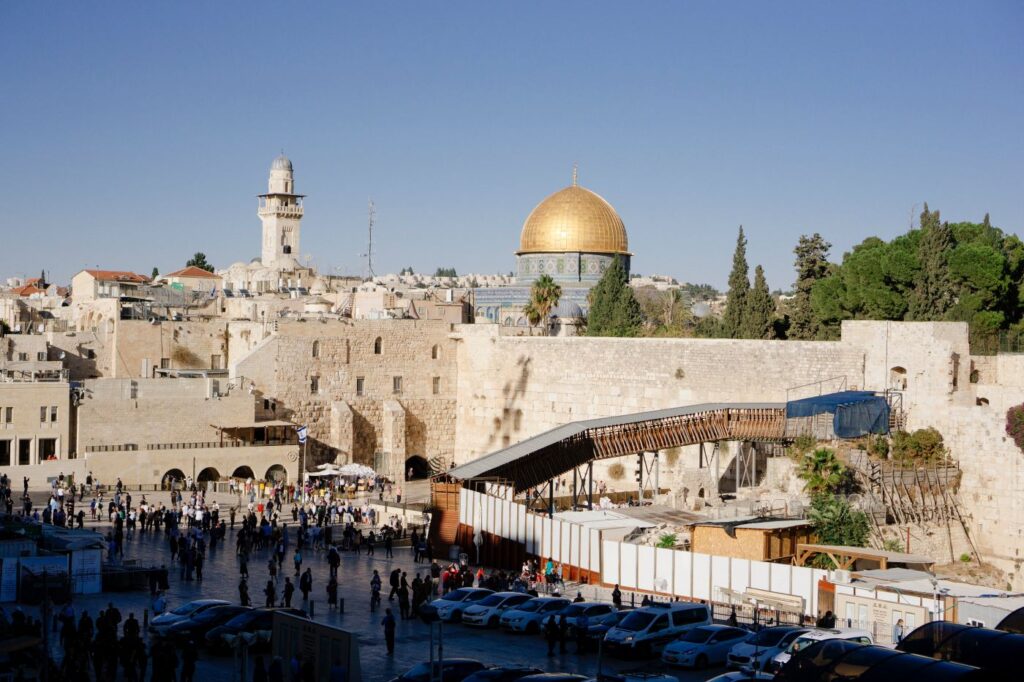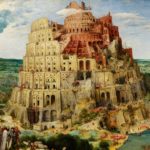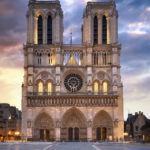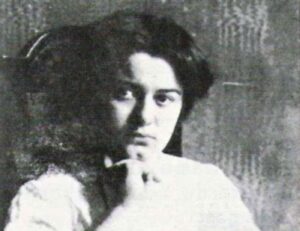I grew up on stories of Jewish tragedy and Jewish heroism—of unbearable suffering and unfathomable courage. Many such stories were still well within living memory during my childhood, and I was blessed to know people who lived through them and could pass them on to me. But, as I was also blessed to have been born in Texas at the turn of the twenty-first century, these stories never seemed particularly relevant to me or the world I was raised in. I was moved as I heard them, but I remember feeling only grateful as I listened—grateful not to have lived through the tragedies, and grateful to the heroes who had sacrificed so much in order that I wouldn’t, and couldn’t, really understand them.
To my surprise, the feeling of personal distance from the disasters and triumphs of Jewish history largely stayed with me even after my move to Israel two years ago. And that isn’t because my decision to move was, in any sense, disconnected from an appreciation of Jewish history. On the contrary, I am a religious Zionist, and my move to Israel was motivated in large part by my belief in the historic importance of the restoration of the Jewish people to their land and of their sovereignty within it. Nevertheless, over the last two years, I have found that life in the Jewish state can often feel far removed from the centuries-long national-religious drama in which, today, it features so prominently.
That distance is mostly a product of Zionism’s astounding success. The Israel I moved to was not a dream waiting to be realized or a fledgling nation teetering on the edge of annihilation, but a prosperous and secure “start-up nation” brimming with opportunity. Despite the genuine idealism that inspired my aliyah—literally “ascent” to the Land of Israel—my life here never tested my commitment to those ideals. Israel, to me, is the place where I met my wife and started a family. It is the place where we live in relative comfort, enjoying the benefits of Israel’s thriving economy and a flourishing Jewish national culture. There have been plenty of opportunities over the last two years to reflect on the significance of our presence here, but for the most part, it is a blessing that I have come to take for granted.
The Israel I moved to was not a dream waiting to be realized or a fledgling nation teetering on the edge of annihilation, but a prosperous and secure “start-up nation” brimming with opportunity.
Start your day with Public Discourse
Sign up and get our daily essays sent straight to your inbox.It is to the enormous credit of earlier generations of Zionists that I am hardly alone in feeling this way. Whereas, during the country’s first decades, Israelis were forced to fight tooth-and-nail for their nation’s future, the stunning degree of their success means that the rising generation of Israelis grew up free from the sense of national-existential fear that haunted their grandparents and great-grandparents. Of course, the very real threat of terrorism in Israel, and the sacrifices required to address it, both served as regular reminders of the challenges that remained. But such tragedies never significantly undermined my generation’s sense that the heroes of Zionism had already succeeded. To us, the Jewish people’s future as a free nation in their own land was an established fact.
While it’s difficult to prove this shift in Israel’s national psyche, there are several trends one might point to as evidence of the change. Motivation among young Israelis to serve in combat units, for example, has been falling for more than a decade, hitting a record low in 2022. This drop is especially pronounced among draftees from wealthier communities who increasingly hope to serve in one of Israel’s elite cyber units—units whose alumni are far better positioned for career success in Israel’s tech-driven economy. Similarly, the rate of Israeli soldiers reporting for reserve duty has collapsed in recent years, falling to a mere four percent of all those eligible in 2022. Speaking to Haaretz last year, retired Israeli general Ariel Heiman explained the decline by pointing out that, “as of now, there is no existential threat to Israel, so people tell themselves: ‘They don’t really need me, so there’s no reason for me to come.’”
Cocooned in the security blanket provided by the IDF and the Iron Dome, it seems that many Israelis, like me, began to believe that the Jewish people had entered a new chapter of their history—one safely divorced from the agony and fear that dominated Jewish life for more than 2,000 years. In the grand sweep of history, we could only harbor the illusion of Jewish invincibility for a very short time. But it’s crucial to understand this brief period of dreamy complacency in order to fully comprehend the historic significance of our violent awakening on October 7th.
Cocooned in the security blanket provided by the IDF and the Iron Dome, it seems that many Israelis, like me, began to believe that the Jewish people had entered a new chapter of their history.
October 7th
On the Shabbat of October 7th, my wife and I were staying with her family in Jerusalem to celebrate Simchat Torah, the last of the Jewish high holidays. The air-raid sirens that morning alerted us to an unusual attack, but nothing in them prepared us for the sights that would greet us at the end of the day. After the Sabbath ended, we turned on our phones and sat in stunned silence, scrolling.
Searching for the words to make sense of what I was seeing on my screen, I recalled a famous poem by the great Yiddish author and early Zionist thinker Chaim Bialik. Written in 1904, “In the City of Slaughter” describes Bialik’s trip to Kishinev, Ukraine in the aftermath of a bloody pogrom that took the lives of forty-three Jewish men, women, and children. “Arise and go now to the City of Slaughter,” it begins.
Into its courtyard wind thy way;
There with your hand touch, and with the eyes of thine head,
Behold on tree, on stone, on fence, on mural clay,
The spattered blood and brains of the dead.
Unimaginable horrors invited barely articulable questions. Over dial tones, we prayed that our calls would be answered—that we would hear the voices of our brothers, our sisters, our grandparents, our friends. We were lucky; they were safe. But whose children, then, had been murdered? Whose parents, then, had been taken? How could this have happened?
Pass over the shattered hearth, attain the broken wall
Those burnt and barren bricks, whose charred stones reveal
The open mouths of such wounds, that no mending
Shall ever mend, nor healing ever heal.
The videos were almost too surreal to process. On Israeli streets that look like ours, men and women who looked like us were brought out of their homes, gathered in groups, and executed in the bomb shelters built to protect them. In towns deep within Israeli territory, armed men moved methodically from house to house, slaughtering the families barricaded inside. In the palm of my hand, I watched a small boy weep after witnessing his sister’s execution. I saw a young Jewish woman—her naked body beaten and bloodied—paraded through the streets of Gaza, surrounded by ecstatic, death-intoxicated revelers.
Pause not upon this havoc; go thy way
Unto the attic mount, upon thy feet and hands;
Behold the Shadow of Death among the shadows stands.
Why, I wondered, would the murderers record and share their atrocities with an inevitably outraged world? Scrolling further down my Twitter feed, I quickly understood the depth of my own naiveté: These men were not confessing, but rather, openly bragging to adoring friends and supporters around the world. In Gaza City and Ramallah, in Tehran, Berlin, and New York, I saw people joyfully take to the streets, light fireworks, and wave the Palestinian flag.
Brief-weary and forespent, a dark Shekhinah
Runs to each nook and cannot find its rest;
Wishes to weep, but weeping does not come;
Would roar; but is dumb.
Older Israelis warned me against watching the videos. “Nothing good can come of that,” they told me, “There’s nothing in them that you don’t already know.” Like millions of other Jews around the world, I was up late that night—and many nights since—watching them anyway, and I have confirmed that they were wrong on at least the latter account. Until I watched the videos, I didn’t know what the screams of those facing execution sounded like. Nor could I ever have imagined the bone-chilling laugh of the executioner. Until October 7th, I didn’t know what a pogrom was. Until October 7th, I didn’t believe a pogrom was still possible. On October 7th, for the first time in my life, I finally began to understand the stories I had been told as a child.
Like the verses of Bialik’s “In the City of Slaughter,” those stories had warned me of the horrifying vulnerability of the Jewish people, and of the enormous sacrifice and resolve it would take to overcome it. On October 7th, I realized how utterly wrong I had been to regard them, merely, as history.
Like the verses of Bialik’s “In the City of Slaughter,” those stories had warned me of the horrifying vulnerability of the Jewish people, and of the enormous sacrifice and resolve it would take to overcome it. On October 7th, I realized how utterly wrong I had been to regard them, merely, as history.
Renewal
Among Israelis and Jews around the world, the massacre of October 7th appears to have precipitated a similar recollection of repressed stories and memories. Perhaps this is what the terrorists aimed to achieve. In a single day, our only recently acquired sense of invincibility was smashed to pieces. We can, for the first time in decades, recall what it is like to feel powerless in the face of tremendous evil. In addition to the agony and human toll of the carnage—more than 1,200 murdered and 3,700 injured—we are mourning the loss of our own sense of security.
What the terrorists behind the pogrom certainly did not anticipate, however, was the Jewish people’s instinctive response to this sudden, shared sense of vulnerability. In my life, I have never seen anything that can remotely compare to the transformation of Israeli society in the immediate aftermath of the attack. Overnight, military-age men disappeared from civilian life. A relative of mine who serves as a logistics coordinator in the IDF told me that, within a day, reserve battalions were overwhelmed with the numbers that had reported for duty. An avalanche of reservists who had not yet been mobilized showed up anyway, offering to fight in whichever deployed unit would take them.
But it wasn’t just our soldiers who mobilized. Without an order being given, Israeli civil society—and, really, the entire Jewish world—rallied en masse to support the Jewish state and its military. Within hours, restaurants and private kitchens were transformed into home-front command centers, orchestrating vast supply operations along with deliveries to every part of the country. Community centers and libraries became emergency provision centers overnight, working with Jewish communities around the world to import aid for those who needed it. To plug the holes caused by the sudden absence of reservists and the flight of foreign workers, Israeli teenagers began volunteering in every part of the economy, harvesting fruits and vegetables on farms and stocking grocery store shelves.
This mobilization is visible in every sector of Israeli society. For example, many Haredi Jews (sometimes also referred to as “ultra-Orthodox”), who have long been famous for their ambivalence regarding Zionism, are now flying Israeli flags from their cars and homes. They are volunteering to cook food and deliver supplies to bases where they pray for the safety of Israeli soldiers. Most strikingly, after years of near-universal Haredi opposition to IDF service, the last month has seen thousands of Haredi men submit applications to serve.
What was, just weeks ago, a deeply divided nation has emerged more unified and collectively resolved than at any point in recent history. In September, the highways were littered with political banners accusing each and every political faction of “betraying the nation” or “destroying democracy.” But the banners that fly today carry only one message: B’yachad Nenatzayach—“Together, we will be victorious.”
How can we explain the sudden unity of purpose, fighting spirit, and steely resolve that have emerged among Israelis?
On the one hand, one can simply point out that most nations will rally together when confronted by a common threat or enemy. But I think it’s clear that this phenomenon takes on special meaning and intensity among Israelis. This is because, unlike most other peoples, Jews can readily imagine what it would mean to become homeless and stateless. We still remember a world in which, as today, many greet the enthusiastic slaughter of Jews with indifference or celebration, but also, in which we lacked a Jewish state that could respond and retaliate. In being forced to recall the world before Israel—to confront the enduring possibility of national tragedy and a return of Jewish vulnerability—we can no longer take our shared home for granted.
Outside of my own experience, it’s difficult to point to any conclusive evidence that this is the psychology behind the historic changes in Israeli society since October 7th. In an effort to bring some objectivity to my assessment, however, I will conclude by quoting the popular Israeli musician Hanan Ben-Ari in his recently released song, Moledet (“Homeland”). In the weeks since its release, the song has been played many millions of times across social media, YouTube, Spotify, and Israeli radio.
Written as a love song to the Land of Israel itself, Moledet begins on a dark note, emphasizing themes of loss, memory, and disappointment:
I hope that you still guard
The joyful memories as souvenirs
Once, they wrote you poems—
Do you remember?
….
The Prophets envisioned you otherwise,
But someone fell asleep on duty.
Where is their dream?
There is no truth, no peace.
No justice, just brokenness.
In being forced to recall the world before Israel—to confront the enduring possibility of national tragedy and a return of Jewish vulnerability—we can no longer take our shared home for granted.
But the pain of loss and sense of brokenness that Ben-Ari expresses are not, ultimately, a cause for despair or resignation. Instead, they become a powerful reminder of his commitment to and love for his homeland—a cause, quite literally, for the renewed writing of poetry. Thus, the song crescendoes in its final verses:
And so, to you, I’ll sing an ancient song.
To you, I’ll remain faithful forever.
Forever—I will never break this vow.
In peace and distress,
In sweetness and bitterness,
With you alone, I’ll sing.
You are the only one—
My homeland eternally.
Even to the end of the abyss,
Into the depths of Hell,
You are Paradise.
Image by Haley Black and licensed via pexels.com. Image resized.













